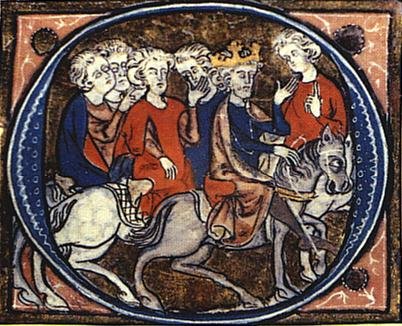
ENGL 622
Sir Thomas Malory and
and His
Literary Descendants
Dr. Jo Koster
228 Bancroft
323-4557 (o)
kosterj@winthrop.edu
http://faculty.winthrop.edu/kosterj
Office Hours:
Reserve List
Starting Point Papers. These short papers are intended to give you practice in developing critical stances, so they must have a point (a/k/a a thesis) to make, must support your point with specific, concrete details from the text, and must show that you have read the entire assignment, but do not need to involve extensive outside research. This assignment counts as 25% of your final grade (5% each).
Content: For the first two papers, I will give you a starting point, but for the rest of the papers, you must provide a relevant quotation or critical starting point and work from it yourself.
Procedures: You must do five out of seven of these papers during the semester to pass the course (you may do more and drop the two lowest grades if you prefer). I'll ask everyone to do the first two, and then you can choose dates to submit three more during the semester, BUT you may not go more than four class meetings without submitting a paper (they can't all come in at one time, at the end of the semester, for instance). These should be between two and three double-spaced typed pages, exclusive of Works Cited page. You need not submit a paper of any kind in the weeks when you are discussion leader but this does not excuse you from turning in the minimum of five papers. These assignments are due at NOON on the assigned dates, and I'll do my best to have them graded for you before class begins.
Topic 1 (due Weds. Sept 2 at noon): Literary scholars often have a hard time associating a literary work with an author of questionable character. Thus, there are all sorts of attempts to cover up Chaucer's rape charge, or Dickens' abuse of his wife, etc., etc. When you read that Malory was a convicted rapist, cattle thief, extortionist, and general mayhem-maker, how does that knowledge affect your expectations of the literary text? Are you more likely to read Malory's reflections on human behavior cynically, or do you consciously divorce the maker and the work, or how do you approach it? Try to explain not only WHAT you do, but WHY.
Topic 2 (due Weds. Sept 16 at noon): One of the issues that particularly affects scholars working with pre-modern texts is the question of textual scholarship--how do we know that somebody wrote something? That it represents the text that author intended? For those of you who usually work with texts that the author saw through to print (say from 1800 forward), this is probably a new question to you. So here's your task: Evaluate how much you have been trained to rely on the edition presented to you (whether in an anthology or an "authorized" edition) as being the "real" version of a particular literary work. Then connect that to how you react to Malory's work, which exists in two different textual forms, neither of which is apparently what he wrote.